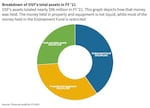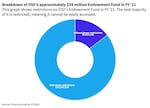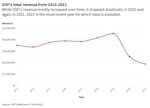The Oregon Shakespeare Festival, 88 years old, is the primary cultural attraction in Southern Oregon. It’s also one of the largest professional regional repertory theater companies in the country, which is why a recent announcement about an emergency fundraising campaign seemed sudden to many in the community.
In April, OSF announced it needed to quickly raise $2.5 million, or else shut down the 2023 season, which was set to begin only a week later. In June, it said it had met that goal, but now needed to raise another $7.3 million to complete the season.
Related: Oregon Shakespeare Festival says it needs $2.5 million to save the theater’s future
According to OSF’s audited tax documents from 2013-2021, there are a variety of reasons why the theater company ended up in such a tight spot.
Lack of liquid assets
The first has to do with how OSF holds its assets. According to its 2021 financial audit, the nonprofit’s total assets were nearly $96 million. But the majority of those assets were held in ways that weren’t easily usable.
“If you look at their total assets, or total net worth, [it] actually looks quite high,” said Renee Irvin, director of the School of Planning, Public Policy and Management at the University of Oregon. Irvin specializes in nonprofit finance and reviewed OSF’s 990 tax forms.
“You have to take into account that a lot of that is in the form of their land and buildings. So that’s, you know, their buildings are worth quite a bit. You can’t just simply get rid of your stages. So it’s very non-liquid,” she said.

Jane Vaughan / Jefferson Public Radio
While this breakdown is normal for big arts nonprofits, Irvin said, it also means OSF couldn’t easily access that money.
In addition, almost all the money held in its approximately $39 million endowment fund was restricted by donors to be used for specific purposes, according to OSF’s financial audit from FY21. Only about 15% of the theater’s endowment fund was unrestricted.

Jane Vaughan / Jefferson Public Radio
OSF was left with about $25 million in cash and other assets, which include investments, inventory and prepaid expenses. While that might seem like a lot of money, the company’s total operating expenses for FY21 were over $18 million.
So although OSF’s assets totaled about $96 million, those assets were mostly restricted or held in the form of things like buildings, meaning it couldn’t actually be used to address financial problems.
“OSF does have many assets and many advantages and wonderful stages and facilities. But there are times, like our post-COVID world, where the cash has been a little more difficult to lay our hands on,” said Diane Yu, OSF board chair.
Dependence on plummeting ticket sales
Of course, the most obvious answer for these money troubles is COVID-19. It’s no secret that performing arts organizations around the country were hit hard by the pandemic. In March 2020, as worries about the pandemic were becoming clear in Southern Oregon, OSF laid off about 80% of its workforce.
Yu said the company was affected both by COVID and by choking wildfire smoke, which forced it to cancel some shows in its outdoor Elizabethan theater.
“We’ve been basically in a recovery mode since the 2020-21 pandemic. And I think that’s the real reason why things have been stressed more. We’ve had some management and infrastructure issues that didn’t adapt well to those two major business disruptions,” she said.

A file photo of Oregon Shakespeare Festival's 2018 production of "Romeo and Juliet" in its Elizabethan Theatre. In 2020, choking wildfire smoke forced the festival to cancel some shows planned at this outdoor theater, at a time when COVID-19 restrictions prompted cancelations of indoor events.
Kim Budd / Courtesy of OSF
Some in Ashland also say OSF’s decline in ticket sales is the result of alienating its core audience of primarily white, middle-aged tourists through shows that are too focused on social justice and racial issues rather than on traditional Shakespeare.
Yu said that, historically, OSF has gotten 70-80% of its operating revenue solely from ticket sales for plays.
Liam Kaas-Lentz, managing director at Portland Center Stage, said theater companies usually earn about 50-60% of their revenue from ticket sales. He said Portland Center Stage’s ticket sales are currently down by about 30%.
Related: Multiple Oregon Shakespeare Festival performances canceled due to COVID outbreak
Meanwhile, OSF’s revenue from ticket sales plummeted during peak COVID years by almost 98%, according to an analysis for Jefferson Public Radio by Kevin Marold, a forensic accountant in Portland who reviewed OSF’s audited financial statements between 2013 and 2021, the most recent years they were available. He excluded 2019 from his analysis because a lack of detail in those tax documents made it difficult to compare to other years.
As the vast majority of OSF’s revenue from ticket sales went away during the COVID emergency, and the majority of its other assets were held in infrastructure like buildings, it had few options to pay the bills.

Jane Vaughan / Jefferson Public Radio
To adjust, OSF has also performed fewer shows and shortened its season in recent years. That was meant to be a way to save money but, Yu said, it also meant there were fewer tickets to sell and fewer ways to make money.
“Those things which are consistent with trying to conserve on the expense side do have an effect on the revenue side,” she said, calling the resulting situation “an exquisite challenge.”
Yu said ticket sales currently make up between 25-35% of the theater’s revenue.
In addition, Marold said, OSF’s memberships have declined recently.
“During 2020 and 2021, memberships contributed approximately $1.8 million on average, or a decrease of nearly 60% of the historical norms,” he said, basing that on his analysis of OSF’s audited financial documents.
According to OSF’s new interim executive director, Tyler Hokama, the nonprofit’s 2022 audited financial statements are not yet complete.
Reliance on one-time gifts and grants
Without those ticket sales or memberships, OSF has become increasingly reliant on one-time gifts and grants, Marold said.
Irvin said the type of grassroots emergency fundraising campaign that OSF did earlier this year can really only be a one-time strategy.
“The unusual thing to me is the very public nature of the ask. It is unusual to, and very difficult actually, to raise money for a budget deficit. That just doesn’t excite donors in general. So you can do it maybe once and say, ‘Hey, we’re in a tough spot,’” Irvin said. “But, you know, putting your hands out and asking for an extraordinary gift like this, with a grassroots appeal, is sort of a one-time strategy, and you can’t do this year after year.”
“Our model was fine when we didn’t have all these crises,” Yu said. “But the crises that we’ve experienced have had an impact. And that’s what we’re adjusting to now.”
The Shakespeare company received over $5 million in Paycheck Protection Program pandemic loan money, nearly all of which was forgiven. In November, it received a $10 million grant from The Hitz Foundation, and in December the OSF board released $4.5 million from its endowment fund to help support operating expenses. Yu said that money has all been spent.
“Without those one-time forms of other support, the organization would have already been done for,” Marold said.

A sign in downtown Ashland advertises Oregon Shakespeare Festival's emergency fundraising campaign in 2023.
Jane Vaughan / Jefferson Public Radio
OSF’s long-term viability
Irvin praised OSF for cutting costs in recent years and said its administrative salaries were quite modest.
“We are moving in the right direction, I believe, and if we continue to keep moving forward together, we will keep, you know, having shows and having live theater at OSF,” said Kamilah Long, interim development director.
Marold, meanwhile, said that, based on his analysis of OSF’s tax history, he’s unsure about its long-term viability, with a lack of cash flow, the difficulty of relying on one-time gifts and dwindling ticket sales.
“My goodness, I would say they are in danger,” he said. “What I see is a company that has lost its most significant revenue stream and is generating some pretty significant losses.”
He said OSF’s financial statements did not reveal any red flags or suspicious activity.
According to an interview with Long in April, the company’s financial trouble “predates the leadership. And so it’s not even a leadership problem. It’s just a cumulative problem, I believe, that has been not addressed for a while.”
Of course, OSF is not the only theater struggling and depending on grants and other funding.
“It is not hyperbolic to say that the field itself is on a precipice,” said Kaas-Lentz. “It’s going to take a lot of government agencies and foundations to step up and keep the industry from closing down.”
Former Executive Director David Schmitz, who left OSF in January, did not respond to requests for comment.
Yu said planning for next year’s season has “a slight pause on it,” and said OSF will need to do more fundraising for that. The company will announce additional specific fundraising goals for the 2024 season later this summer, after the nonprofit’s annual budget has been completed.
Still, Yu is optimistic about the future. OSF hopes the recently-hired Hokama will put the company on the right path.
“We know what some of both the infrastructure and these cash flow issues are,” Yu said, “and acknowledging the issues and knowing what they are is the first step towards resolving them.”